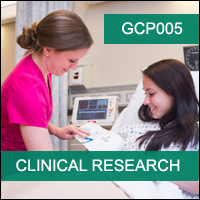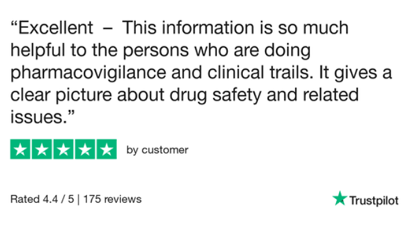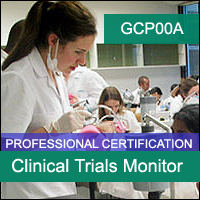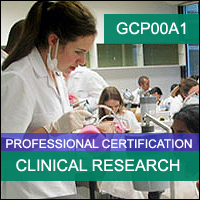Clinical Trial Monitoring: Documentation and Closure
 |
Price: $ |
Document your dedication to quality, compliance, safety, and job performance by earning a certification of training.Training Program: Clinical Trial Monitoring: Documentation and ClosureTraining Provided By: Biopharma Institute Website: https://www.biopharmainstitute.com Schedule: Self-paced. Immediate access to training materials upon enrollment. Description:  The sponsor of a clinical trial must arrange for it to be monitored throughout its duration to ensure that the rights and wellbeing of subjects are protected, the trial data are accurate, complete and verified from source documents, and the conduct of the trial complies with the study protocol, Good Clinical Practice and regulatory requirements. In this module we describe how a Clinical Research Associate (CRA) monitors an ongoing trial to its conclusion. After a brief overview, the course consists of topics such as the following: closeout visit, essential documents, source document verification, CRF review, monitoring visit, fraud and scientific misconduct, and a key point summary at the end. Certification Requirements: Students must view the entire course and successfully pass an online, multiple-choice final assessment within a 12-month period. A certificate of completion is immediately accessible in PDF format after satisfying the requirements. Biopharma Institute's online training courses include immediate access after enrollment. Username, password, and instructions are emailed to the student directly following online enrollment into the program. Course takers may attempt the final assessment any number of times, as needed, to achieve a passing score. The certificate of completion is promptly launched and made available to the student upon course completion. Certificates are issued in an encrypted PDF format, and include a watermark, unique validation code, and QR verification barcode. Once all training requirements have been satisfied the achievement can be verified from our website using the unique certificate ID or QR barcode located on the certificate. For professional certification programs, a digital badge is additionally issued to verify training and document the achievement. Digital badges can be displayed on social networking sites, such as LinkedIn, Facebook, Twitter, and Badgr. Biopharma Institute certificates and digital badges include the date of completion, but do not have an expiration date. However, compliance training is typically considered valid for a period of 3 years. Many organizations suggest that compliance training should be refreshed at least every three years to stay up to date with regulations, standards, guidelines, and to reinforce the importance of maintaining compliance. The validity period for employee compliance training would be determined by those responsible for managing quality assurance. |
Outline:Module overview Sets out the module's scope, objectives and notes on terminology. Site monitoring visits Regular visiting of investigational sites by a CRA is the front line of clinical trial monitoring. The visits allow face-to-face interaction with study site personnel and direct access to source records and site resources, providing the best opportunity for the CRA both to assess and to influence the progress and quality of a trial. In this session, we discuss monitoring tasks, the frequency and duration of visits, preparation for a visit, the kinds of deficiencies that may be found at the site, interaction with study staff, assessment of protocol compliance in a variety of areas, investigational product and subject recruitment issues, review of findings, and report and follow-up. Data checking Review and verification of data in CRFs and source documents is considered by many to be the CRA's principal task. It takes up most of his or her time on a monitoring visit and constitutes the primary measure taken on behalf of the sponsor to assure the quality of the data provided by the investigator. In this session, we describe how to carry out CRF review and source document verification (SDV). We discuss the extent of SDV required, outline differences between paper and electronic CRFs, identify aspects of trial conduct for which CRFs and source records should be checked, discuss on-site corrections and resolution of discrepancies, and outline data retrieval and data query procedures. Close-out visit Almost all clinical trials require an on-site visit to close the study at a site, irrespective of whether routine monitoring visits have been made. In addition to completing tasks typically carried out at a routine visit, the CRA will be required to perform some actions specific to the end of the trial, such as retrieving or authorizing the destruction of unused supplies, retrieving some essential documents, and reminding the investigator of continuing responsibilities. In this session we describe the close-out of a trial at an investigational site. Risk-based monitoring Monitoring of clinical research by traditional methods, particularly as regards data checking, is time consuming and laborious. In recent years, regulatory authorities have focused attention on ways of making quality management in general, and monitoring in particular, more efficient through a risk-based approach. Implications of this approach include: increased emphasis on centralized monitoring rather than site visits; and a move away from 100% source document verification toward risk-based and statistically directed sampling of data. In this session we provide a brief introduction to principles of risk-based monitoring. Fraud and scientific misconduct The great majority of healthcare professionals undertaking clinical research act with honesty and integrity. However, cases of scientific misconduct and downright fraud do occur. Besides damaging the reputations of those who commit them, such actions have potentially serious consequences for the research and might even affect public health. In this session we distinguish error, misconduct and fraud, discuss the CRA's role in detecting them, and describe their consequences. Assessment Multiple-choice mastery assessment. | Objectives:Who will benefit from this module? The module is intended for those involved in clinical research and development, in particular the monitoring of clinical trials, and those who require an understanding of what this entails. It and its companion module CT06 provide a comprehensive introduction to monitoring for new CRAs, or additional training and professional development for those already working in the field. It will also be of value to a clinical research coordinator (CRC), clinical investigator and other healthcare professionals involved in clinical studies. Learning objectives
| |
This Course is Included in the Following Professional Certification Program(s):
 | Clinical Research Associate (CRA) Professional Certification ProgramProgram ID: GCP00APrice: $845.00 (USD) |
 | Clinical Trials Management (US & EU) Professional Certification ProgramProgram ID: GCP00A1Price: $1295.00 (USD) |
Benefits of Being Certified from Biopharma Institute: Throughout our training students will be engaging in active learning using interactive eLearning modules validated by 3rd party organizations for relevancy, compliance, and regulatory content. Courses are developed by subject matter experts (SMEs) and instructional design professionals with the goal to promote the students' retaining of key knowledge. The programs further offer access to regulatory references, real-life case studies, and introduce other important information necessary to assist with learning. Since 2003, Biopharma Institute has been aiding both professionals and their corporate employers with fulfilling training requirements. Biopharma Institute's certifications are recognized by a wide spectrum of industries, regulators, and companies around the world. Furthermore, our training solutions are customizable to any organization's training needs. Today, Biopharma Institute offers over 300 courses training on clinical research, drug manufacturing (cGMP), regulatory affairs, validation systems, pharmacovigilance, good laboratory practice (GLP), and data integrity. We supply our training to clinical research, pharmaceutical, and medical device industries.
Employee / Corporate Training: For corporations seeking a method to train employees, economically, without having to set aside time for travel, webinars, or live, in-person training; Biopharma Institute is the training partner you can rely on. Our training provides an effective, engaging, self-paced learning experience which fits conveniently into the day-to-day activities of most types of learners. Our eLearning modules are SCORM-compliant and can be delivered from most corporate learning management systems (LMS). We catering to both small-scale and large-scale training requests, with the same goal in mind: To make this a good experience for everyone involved, from the students to those managing the group training.
Use our Search Form to Find What You're Looking For:
Benefits of Training with Biopharma Institute
| Immediate access to courses: | Username, password, instructions, and receipt of payment are immediately emailed upon online enrollment. |
| Self-paced, asynchronous eLearning: | 24/7 access to all course materials and assessments for 12 months. |
| Open enrollment: | No prior course prerequisites or work experience required. |
| Expertise: | Courses developed by subject matter experts (SMEs) in the area being taught. |
| Current and validated: | Training is current with respect to regulations, procedures, and 3rd party validated and/or accredited. |
| Optimized for learning: | Courses include voiceovers, easy navigation, reading materials, case studies, progress checks, and high-quality animations to increase retention of subject matter. |
| Secure and safe access: | Encrypted website and LMS connections, firewall, and daily malware scans deliver optimal security and performance. |
| Flexible final assessments: | Multiple-choice questions can be taken repeatedly until a passing score is achieved. |
| Direct access to certificates: | Upon completion, certificates are immediately issued in an encrypted PDF format. Certificates include a watermark, unique validation code, and QR verification barcode. |
| Verification of training: | Certificates are verifiable online using QR barcode or the unique ID code. Digital badges are additionally issued for all professional certification programs. |
| Training manager access: | A proprietary portal offers access to download enrollment reports, training records, account balance, and more. |
| SCORM-compliant courses: | Courses can be delivered directly to most corporate Learning Management Systems (LMS). |
| Purchase orders (POs): | POs are accepted from all companies. Request an invoice when starting the procurement process. |
| Reimbursement: | Some employers may reimburse their employees for training expenses. Check your company's policy. |
| Financial assistance: | Payment plans are available to those who qualify. Alternatively, purchasing individual courses one at a time is also an option. |
| Career advancement: | Professional certifications help demonstrate interest and dedication to career and job performance. They may be helpful for those seeking to grow their career or transitioning to a different position within an organization. Professional certifications are a great addition to a resume, offer talking points for the interview, and practical knowledge for performing duties. |
Have Questions? Contact Us:
Use the form below if you would like more information on our programs. You may want to request a quote on group training or an invoice for generating a company purchase order. For quotes or invoices please provide the course(s) and number of students. Alternatively, call toll-free from the US or Canada: +1 (888) 424-6576. International callers may dial: +1 (201) 301-8370.

 Download
Download 




